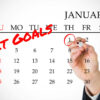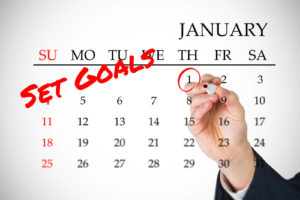
New Year’s Resolution: Healthier Eyes
Happy New Year! Congratulations to one and all for making it through another year. Now, let’s talk about resolutions. We don’t all make them, but an awful lot of us do. Twenty-nine percent of all Americans are estimated to set goals every year, most of which are related to health or exercise. Losing weight is statistically the most common New Year’s resolution, hence the well-known phenomenon of the January gym rush.
But one part of the body tends to get left in the treadmill dust. This year, whether you’re slimming down or bulking up, don’t forget to get your eyes in on the action. Healthy vision does some wonderful things for your quality of life, so keep a resolution or two for your peepers. We’ve included a few things to consider while making your New Year’s resolution about healthier eyes.
Select Your Goals
 Any self-improvement program needs concrete goals to succeed. It’s awfully hard to decide when you’ve succeeded at “exercising” without a goal. But, it’s much easier to hold yourself accountable for the three weekly gym visits you resolved to make. Your eyes need some goals, too. Look for areas where you know you can improve your vision habits and make changes that will have some positive impact.
Any self-improvement program needs concrete goals to succeed. It’s awfully hard to decide when you’ve succeeded at “exercising” without a goal. But, it’s much easier to hold yourself accountable for the three weekly gym visits you resolved to make. Your eyes need some goals, too. Look for areas where you know you can improve your vision habits and make changes that will have some positive impact.
Make sure to match your resolutions to lifestyle, profession, and other personal considerations. Now, if you’re suffering from a serious disorder, such as glaucoma or cataracts, then making your resolution gets a lot easier. Find appropriate help. For the rest of you just looking to make common-sense alterations to keep your eyes healthy, then read on. First, we’ll list a few possible problem areas that might call for resolutions.
Hit the Gym!
Yep, it’s the oldest resolution around, but it’s a good idea. Aerobic exercise does a body a whole world of good, and eyes can absolutely get in on the action. Running has been proven to significantly cut down your risk of developing eye diseases. Researchers have found that consistent long-distance runners were considerably less likely to develop glaucoma as well as cataracts (clouding of the eye’s lens, which can eventually lead to blindness).
Regular exercise can also help prevent age-related macular degeneration. AMD is a condition that seriously impairs vision in the center of the visual field (macula) and is caused by age-related damage to the retina. It’s a serious, and relatively common, problem for anyone over 50 years of age. And, like cataracts, it’s seemingly affected by exercise. So, if you’re on the edge of starting a workout regimen, this is one more good reason to do so.
Take Some Breaks
For many of us, the greatest threats to vision are in the workplace. Many Americans spend their workdays staring at computer screens. This is a problem that isn’t helped by the fact that most of us spend our leisure time also staring at computer screens. These long, unbroken stretches of screen time can cause some serious eye-related troubles.
Prolonged computer work hits the eyes in a couple of different ways. First, as you may have noticed, computer screens encourage the “zombie stare.” Or, the fixed, unblinking gaze that you’ve likely seen all around you during tense office days. Dry eyes are often the result, and they’re not to be taken lightly. They’re severely uncomfortable and often cause burning, itchy, or “gritty” sensations. Chronic dryness will very occasionally cause nastier problems and can even lead to a loss of vision. Second, all that time staring at a screen right in front of your eyes will strain your eye muscles, leading to intense discomfort.
The solution? Take a break. Give the 10-10-10 Rule a try to give your eyes a rest. Look away from the screen every so often. Doing so breaks up that stare, helping to fight eye dryness. And letting your eyes focus on a far-field object for a change prevents muscular strain. Resolve to follow these rules, and you’ll be doing your eyes a favor. Work timers are easily found and are a simple way to remember to relax. Simply put one on your desk and set it for every hour. When it goes off, close your eyes for a minute or do the 10-10-10 Rule.
Outdoor Eyes
If your day-to-day often takes you outside, then there’s a different set of risks to keep in mind. Sunlight’s not great for your peepers, pretty as it is. Stay out for too long, and you can wind up with photokeratitis. This is basically a sunburn of the eyes that’s often described as feeling like sand in the eyes. Even worse, cancerous tumors can also develop after excessive UV exposure.
The solution’s fairly simple. Don’t spend too much time outside without eye protection. This applies even on cloudy days, as UV light is the issue here, and it can still come through in overcast conditions. Ideally, though, wear your shades. A good pair of sunglasses can sharply cut down on the amount of UV reaching your sensitive eyes.
A Different Sort of Workout
No matter where you work, you can also benefit from an eye exercise program. Getting your eye workouts in should be an easy resolution to make. Doing so helps stave off some of the vision loss that inevitably comes along with age and can help improve your quality of life for years to come.
How can you ensure you keep up with your vision-related resolutions? Consider using a habit-tracking system. In your planner or on your calendar, designate a special symbol for each resolution. Each day you complete the habit, mark it in your calendar or planner. The satisfaction of checking off a task is enough to keep many of us motivated.
If you’d like to learn more about natural solutions for healthier eyes, then feel free to check out our other Natural Vision Improvement Articles. You can also find information on eye-specific vitamins and other good supplements for healthy eyes.
Our Rebuild Your Vision Ocu-Plus Formula Contains All 17 Vitamins, Minerals, and Herbal Supplements to Improve Your Eye Health!












Have you ever discussed the subject of droopy eyelids. My optometrist has suggest I need surgery (at the hairline or above the eyebrows) to correct this problem. I was wondering if there might be just a simple exercise that would alleviate this. I do follow the 10-10-10 rule since I work at a computer every day.
Thanks,
Dee
Dear Sir,
Thank you for your information you are sending for me regularly – it is very useful for me.
With the very warm regards
Liuda from LITHUANIA